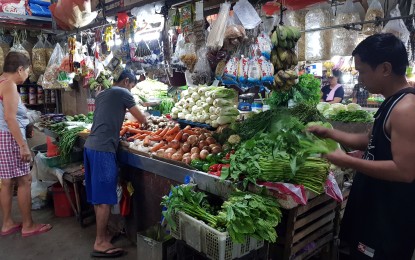
(PNA file photo)
MANILA – Food producers and experts in agricultural economics welcomed the 6.6 percent inflation figure posted by the country in April, but cautioned that a looming El Niño may trigger price pressures upward anew.
In an interview on Saturday, Danilo Fausto, president of the Philippine Chamber of Agriculture and Food, Inc. (PCAFI), attributed the tempered inflation to a bountiful yield during the past harvest season.
He said the good harvest spanned across several key food commodities.
Fausto’s observations were consistent with the Bangko Sentral ng Pilipinas’ report, which pointed out that an improvement in the domestic supply of vegetables, fish, and meat mitigated price pressures last month.
However, PCAFI’s president said there is no assurance that inflation would continue to remain tame into the second half of the year.
“The problem is, we are expecting an El Niño later this year. If that happens, food production may decline by as much as 30 percent, based on our previous experience,” he explained.
To cushion impending supply and price problems, Fausto called on the Department of Agriculture, the National Food Authority (NFA), and other concerned government agencies to start building a buffer stock of important food items.
The NFA’s current stock of rice, he said, is only good for three days, which he called virtually non-existent.
“They (NFA) should try to build up a buffer stock that is equivalent to at least 100 days of the country’s consumption,” Fausto said, emphasizing that today is the time to start stocking up on important food items, instead of waiting for the dry spell, when government agencies may once again be compelled to rush importation at unfavorable prices.
Meanwhile, Roberto Galang, dean of Ateneo de Manila’s John Gokongwei School of Management, said aside from a potential dry spell, local food producers must also contend with a resurgence of the African swine fever and bird flu.
He said livestock diseases threaten to decimate food production, creating fresh supply problems, which will inevitably translate to higher food prices.
However, an ever-present threat to domestic food supply is the sheer amount of food wasted in transport or unsuitable storage facilities, according to Galang, who specializes in agricultural logistics.
The dean said relevant agencies must encourage a more efficient system of transporting agricultural produce from the farm to the market by introducing better storage facilities, eliminating unnecessary middlemen, and forging stronger links between the farmer and the supermarket or retail sector.
“If much less food is wasted en route to the market, and if we have more facilities for long-term storage, then we will be better prepared to meet supply shortages caused by climate changes or animal diseases, and this will mitigate inflation,” Galang said. (PNA)
